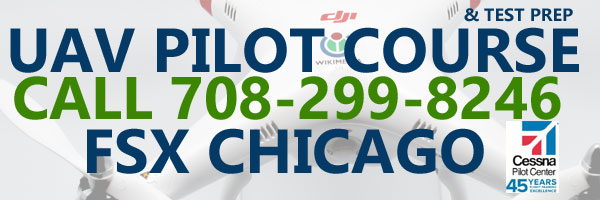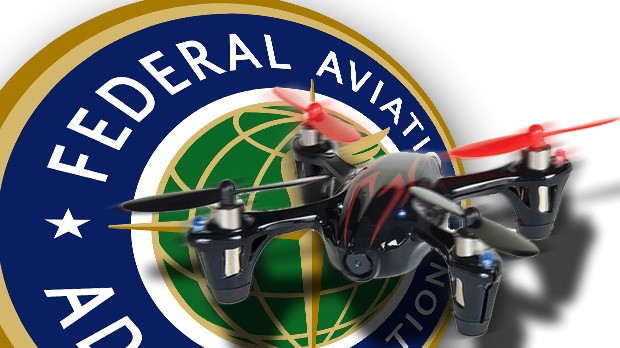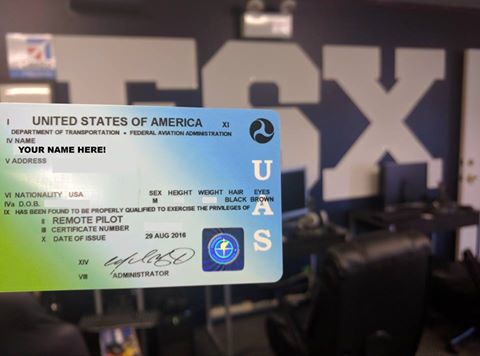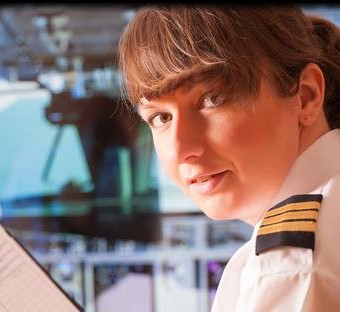This course is currently suspended due to high demand in flight training for Private, Commercial and Airline Pilots.

UAV and Test Prep for FAA Exam
The NEW Small UAS Rule (Part 107), including all pilot and operating rules, is in effect as of 12:01 a.m. EDT on August 29, 2016.
FSX Chicago offers Ground School Training for the UAV Written Exam. Call 708-299-8246 today for more information.

Estimated completion time: 15 hours.
Estimated cost : $500. Call 708-299-8246 for available classes and dates and enrollment information.
First-Time Pilots
To become a pilot you must:
- Be at least 16 years old
- Be able to read, speak, write, and understand English (exceptions may be made if the person is unable to meet one of these requirements for a medical reason, such as hearing impairment)
- Be in a physical and mental condition to safely operate a small UAS
- Pass the initial aeronautical knowledge exam at an FAA-approved knowledge testing center
Pilot certificate Requirements
- Must be easily accessible by the remote pilot during all UAS operations
- Valid for 2 years – certificate holders must pass a recurrent knowledge test every two years
- Initial aeronautical knowledge test – initial knowledge test areas include:
- Applicable regulations relating to small unmanned aircraft system rating privileges, limitations, and flight operation
- Airspace classification and operating requirements, and flight restrictions affecting small unmanned aircraft operation
- Aviation weather sources and effects of weather on small unmanned aircraft performance
- Small unmanned aircraft loading and performance
- Emergency procedures
- Crew resource management
- Radio communication procedures
- Determining the performance of small unmanned aircraft
- Physiological effects of drugs and alcohol
- Aeronautical decision-making and judgment
- Airport operations
- Maintenance and preflight inspection procedures
Instructions for completing the paper application process may be found in Chapter 6, Section 4 of the Part 107 Advisory Circular.

UAS Commercial Pilot License Training. Call 708-299-8246..
Existing Pilots – What to Expect
Call 708-299-8246 for more information.
Eligibility:
- Must hold a pilot certificate issued under 14 CFR part 61
- Must have completed a flight review within the previous 24 months
Remote Pilot Certificate Requirements
- Must be easily accessible by the remote pilot during all UAS operations
- Valid for 2 years – certificate holders must pass either a recurrent online training course OR recurrent knowledge test every two years
Application Process:
- Complete the online training course “Part 107 small Unmanned Aircraft Systems (sUAS) ALC-451
- Applicable regulations relating to small unmanned aircraft system rating privileges, limitations, and flight operation
- Effects of weather on small unmanned aircraft performance
- Small unmanned aircraft loading and performance
- Emergency procedures
- Crew resource management
- Determining the performance of small unmanned aircraft
- Maintenance and preflight inspection procedures
- Complete FAA Form 8710-13 (FAA Airman Certificate and/or Rating Application for a remote pilot certificate)
- Online or by paper (see instructions in previous section)
- Validate applicant identity
- Contact a FSDO, an FAA-designated pilot examiner (DPE), an airman certification representative (ACR), or an FAA-certificated flight instructor (CFI) to make an appointment.
- Present the completed FAA Form 8710-13 along with the online course completion certificate or knowledge test report (as applicable) and proof of a current flight review.
- The completed FAA Form 8710-13 application will be signed by the applicant after the FSDO, DPE, ACR, or CFI examines the applicant’s photo identification and verifies the applicant’s identity.
- The identification presented must include a photograph of the applicant, the applicant’s signature, and the applicant’s actual residential address (if different from the mailing address). This information may be presented in more than one form of identification.
- Acceptable methods of identification include, but are not limited to U.S. drivers’ licenses, government identification cards, passports, and military identification cards (see AC 61-65 Certification: Pilots and Flight and Ground Instructors)
- The FAA representative will then sign the application.
- An appropriate FSDO representative, a DPE, or an ACR will issue the applicant a temporary airman certificate (a CFI is not authorized to issue a temporary certificate; they can process applications for applicants who do not want a temporary certificate).
- A permanent remote pilot certificate
An unmanned aircraft system (UAS), sometimes called a drone, is an aircraft without a human pilot onboard – instead, the UAS is controlled from an operator on the ground.
When you fly a drone in the United States, it is your responsibility to understand and abide by the rules.
